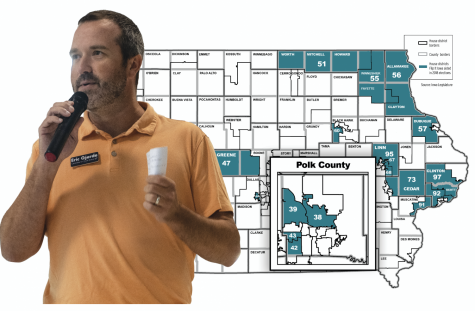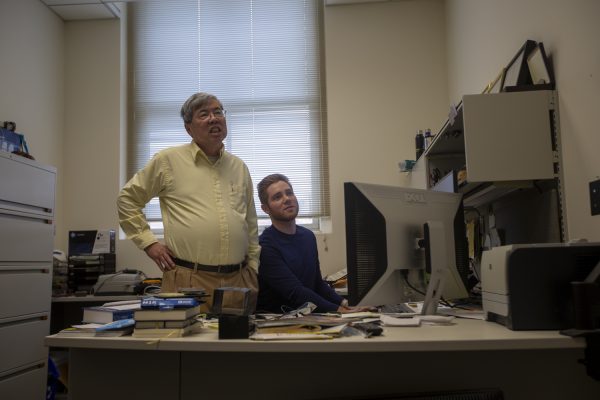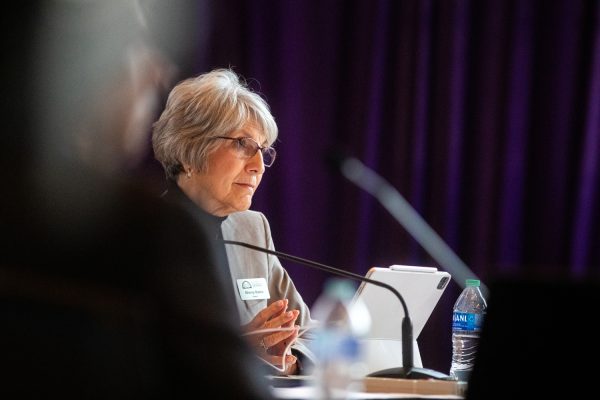UI research shows young women are at high risk of breast cancer
Recent research by the UI’s Paul Romitti shows that the number of women in their 20s with early-stage breast cancer is increasing, and their survival rate is decreasing, more significantly than other age groups.
The Daily Iowan; Photos by Josep
College of Public Health on Wednesday, Oct. 18, 2017.(Joseph Cress/The Daily Iowan)
November 12, 2019
Recent research led by the University of Iowa shows that breast cancer diagnoses are increasing among women in their 20s, while the survival rate of that same illness and age group and is decreasing.
Using data acquired over approximately 15 years from women of varying ages with stage I to III breast cancer, the research focused on the incidence and survival rate for early-stage breast cancer and aimed to increase awareness of the risk among premenopausal women, guiding them towards prevention measures.
According to numbers from the Surveillance, Epidemiology, and End Results Program at the National Cancer Institute, 52 percent of women in their 20s, 49 percent of women in their 30s, and 42 percent of women in their 40s who have breast cancer are Stage II.
Only 24 percent of women with breast cancer ages 20 to 29 are Stage I, and the rest are already in Stages II or III. Comparatively, a greater number of women in their 30s and 40s are in Stage I of those with breast cancer.
Of 149,821 sampled, 2.31 percent were in their 20s.
“To look at what’s the experiences of these women who are in their reproductive years and may have cancer, or have cancer close to their pregnancy, was the idea [in order to see] how often this occurs,” said University of Iowa College of Public Health Epidemiology Professor Paul Romitti.
Romitti and a team of researchers are studying exposure among reproductive-age women and diseases among that same age group. Their research on breast cancer is one example and an extension of greater research activity, he said.
There have been research and reports about incidence and survival of stage IV breast cancer among women, Romitti said.
“But there is really not contemporary data on women who have stage I to stage III breast cancer,” he added.
RELATED: UI tests ‘watchful waiting’ in new breast-cancer study
As the most serious type of breast cancer, Stage IV has received much scrutiny. However, using the most recent data to look at stage I to III breast cancer is helpful, because there are varying levels of risk and treatments for stages I through IV and stage IV, Romitti said.
“In the clinic and when I talked with colleagues, certainly we felt we are seeing more and more young women with breast cancer, and these women are often in their reproductive years,” said Alexandra Thomas, co-author on the research.
Thomas said the team wants to see if breast cancer is indeed increasing among young women. In the research, Thomas said she mainly contributed her clinical perspective about what concerns she’s seen when dealing with breast cancer patients.
Romitti said the data he compiled was collected through several cancer registries throughout the United States.
“My major contribution to this paper is critical review and my understanding of the data that we summit this year, and how that data is put out for public use for researcher,” said Charles Lynch, UI College of Public Health professor and medical director and principal investigator of the State Health Registry of Iowa and Iowa Cancer Registry.
The Surveillance, Epidemiology, and End Results 18 Registries database was primarily used to produce the report of the research, Lynch said. The researchers needed to fill out a form and apply to access the database for use, he added.
“We have a staff that every single day is out there, trying to identify Iowa-diagnosed cancer and then collecting that data to a record,” Lynch said.
RELATED: UI focuses on breast cancer treatment
The cancer registries are updated every year, but the most recent data will always have a two-year gap from the present, Lynch said, because of the time it takes to collect that data — even just in Iowa. Lynch said his team is working on the data from 2017 and will release it soon.
With their report posted online, the research team’s focus on breast cancer will come to an end, Romitti said, but they will keep tracking the data every once in a while.
“[This research] will help guide a prevention, hopefully, and help guide treatments,” Romitti said.




















